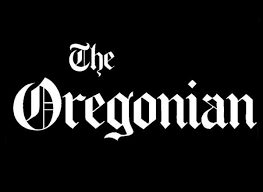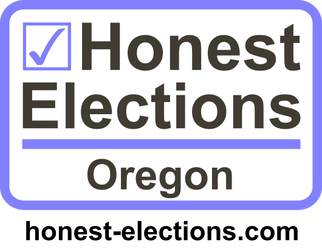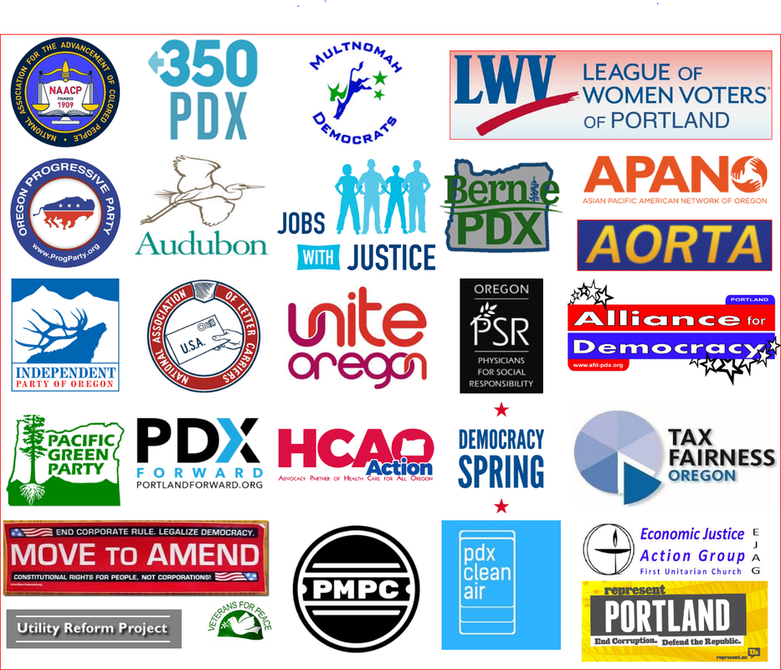Endorsers of Portland Measure 26-200 (2018)
The Press
 |
Portland voters should support the
effort and
vote "yes" for the measure. . . As it is now, wealthy individuals,
labor unions and corporations are the driving forces behind state,
county and local elections, drowning out the smaller contributions from
average Oregonians. The proposal requires candidates to list their five largest contributors of donations exceeding $500 on political ads, a step toward greater transparency in a process that has too little of it. . . .It plants the flag of campaign finance as an issue that voters want to see in Oregon. That's a message that both political parties should hear. |
|---|---|
| Politics, at the local and national level, is increasingly a sport closed to those without enormous financial resources. This measure would provide a necessary corrective to that trend – while also requiring greater transparency from candidates and funders. Vote Yes. | |
| Oregon's campaign
finance
system is broken. The candidate with the most money wins Oregon
legislative races 92 percent of the time, one study showed. And only a
tiny fraction of Oregonians ever contribute to political races. That
means a handful of people—plus labor unions and
corporations—with a whole lot of money effectively decide who
will represent you in government. Measure 26-200 would cap individual contributions in city races at $500 and forbid corporate donations while allowing PACs that are funded by a group of small donors. A candidate's own contribution to the campaign would be capped at $5,000. We agree with all of these ideas. |
|
| The cap would be
$500—a far cry from Oregon’s current system, which puts no
limit on how much individuals or PACs can donate. That drastically
favors well-connected candidates favored by well-moneyed individuals.
(Look no further than Nike co-founder Phil Knight, who, directly and
indirectly has given roughly $3.5 million to Republican gubernatorial
candidate Knute Buehler.) Measure 26-200 would also require that
committees running political ads on behalf of candidates prominently
and clearly identify their top donors. We can’t fix everywhere else—but we can make sure that in Portland, campaign donations are limited, disclosed, and regulated in a way that lets everyone know who stands to benefit in each election. That’s information every voter needs. Vote yes on 26-200. |
|
| Those who are not independently wealthy or
well-connected cannot afford a serious campaign for elected office in
many of Oregon’s more populous jurisdictions. A would-be
candidate shouldn’t have to be rich or in the pocket of
millionaires and billionaires to represent the people of Oregon. We must continue attempting to rein in the out-of-control spending that’s compromising our elected officials. |
|
Political Parties
Community Organizations
|
Neighborhood Associations
Individuals
|
Elected Officeholders
|
Portland City Council
Multnomah County Commission # 1 Oregon Labor Commissioner Metro Council # 6 Oregon House Rep # 46 Oregon House Rep # 33 Portland Community College Board of Directors |
Candidates for Elected Office
|
Jo Ann Hardesty
Alissa Keny Guyer Mitch Greenlick Andrea Valderrama Stuart Emmons Julia DeGraw Mark Ulanowicz Maria Garcia Susheela Jayapal Joe Buck Carol Pauli Dana Carstensen Juan Carlos Gonzalez |
Portland City Council #3
Oregon House Rep # 46 Oregon House Rep # 33 Portland City Council #3 Portland City Council #3 Portland City Council #2 Multnomah County Auditor Multnomah County Com #2 Multnomah County Com #2 Metro Council #2 Metro Council #2 Metro Council #4 Metro Council #4 |
Governor
U.S. Congress, 3rd Dist State Senate #16 State House #15 State House #32 Governor |

